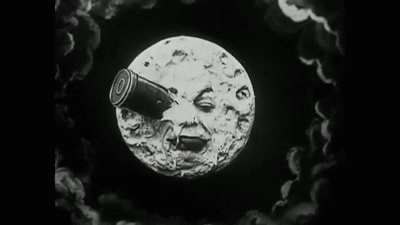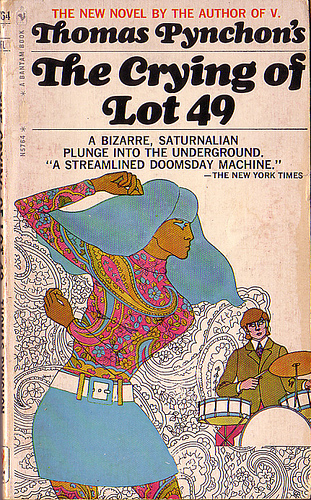BROKEN KNOWLEDGE (6)
By:
October 25, 2025

University of Toronto philosopher Mark Kingwell and HILOBROW‘s Josh Glenn are coauthors of The Idler’s Glossary (2008), The Wage Slave’s Glossary (2011), and The Adventurer’s Glossary (2021). In 2022, they engaged in an epistolary exchange about science fiction. Via the series BROKEN KNOWLEDGE, the title of which references Francis Bacon’s philosophy, HILOBROW is pleased to share a lightly edited version of their exchange with our readers. Also see Josh and Mark’s previous exchange 49th PARALLEL.
BROKEN KNOWLEDGE: FIRST CONTACT | WHAT IF? | A HYBRID GENRE | COUNTERFACTUALS | A HOT DILUTE SOUP | I’M A CYBORG | APOPHENIC-CURIOUS | AN AESTHETICS OF DIRT | PAGING DR. KRISTEVA | POLICING THE GENRE | FAMILIAR STRANGENESS | GAME OVER | THE WORLD VIEWED | DEFAMILIARIZATION | SINGULAR CREATURES | ALIEN ARCHAEOLOGIST | THE PHENOMENOLOGY OF SCREEN-TIME | HOMO SUPERIOR | EVERYTHING IS US.

22nd September, 2022
TORONTO GENERAL HOSPITAL
Hi Josh, thanks for all this great stuff – can see your scholar’s mind at work. I’ll respond to a few details first and then try to add something to the larger questions we’re adventurously, maybe apophenically, pursuing.
- I loved those ERB Mars books! I had the whole series, all without covers (see earlier note) and I would read them on those bus rides downtown or to my Catholic boys’ school across town. I thought the lack of cover made me look mysterious and cool. Why has he torn off the cover of that book? What is he reading that he doesn’t want us to know about? The books also featured a lot of aviation stuff, and were such a relief compared to Tarzan, which I just couldn’t get into.
- I think the hybrid point is just well taken at this stage; we’re definitely on the same page there. I loved the mention of J.B.S. Haldane, one of my favourite science writers. Another great teacher I had in high school gave a class that was a distillation of Haldane’s essay “On Being the Right Size,” Young mind = blown! There can’t be, in this physical universe, 50-foot women (or men). There can’t be giant insects or miniature horses and riders. Haldane was a vocal supporter of Darwinian evolutionary theory, along with T.H. Huxley, known as “Darwin’s Bulldog” and, not without significance, Aldous Huxley’s grandfather. Extreme trivia note: at the end of Vile Bodies (1930), there is a brief apocalyptic war scene in which the protagonist, Adam Fenwick-Symes, reflects on the use of the new super-destructive “Huxdane-Halley” bomb. Now there’s a mash-up! And the only bit of “futurism’ (you can’t call it sf) in Waugh’s naturalistic works.
- The whole issue of categorization is fascinating. It is the nerd’s guiding principle, as mentioned, but also the collectors, plus anyone who grocery shops, packs for a trip, makes a to-do or pros-and-cons list – does anything human, really. Science is all categories! It’s how our minds meet the world, doing our everyday phenomenology. But more on that in a minute. What struck me as I read that part of your intervention was how I used to haunt bookstores where there was invariably a section called “Occult and Philosophy.” So you’d find Bertrand Russell in with Madame Blavatsky or The Doctrine and Ritual of High Magic. No wonder I went from dungeon master to philosophy professor – the categories made me do it!
- Last little point I can’t resist. You have me on P.D. James and The Children of Men – the book is set in 2021, so it’s not counterfactual history. But, for the record, James was a she, not a he. And I didn’t know about the Aldiss story. Also, good call on Never Let Me Go – I assigned it in one of my classes one year and this student came up to me at the end and said, “I will never forgive you for making me read the saddest book in the world.” Devastating – and a terrific film adaptation, too.
These ‘little’ points have taken up a lot of space already, but I want to push things along regarding larger issues. First, I’ll take a swat at your softball on apophenic adventures, hoping for a looper over the left-field fence – dead pull hitter over here. And then I’ll swing at a trickier pitch, the whole idea of “epistemological exercise” and why that’s essential to human existence. But is science the preferred way to go here? Or is it maybe art? We are in the region of C.P. Snow’s “two cultures.” Are there two? Are they hostile to each other? Is sf a bridge between them?
Quick answers: Not by itself, not by itself, no, yes, and maybe.
So: apophenia. It’s the psychological condition of seeing connections everywhere, sometimes to the point of insanity and harm. Conspiracy theorists tend to be apophenic – It’s all part of the plan! In milder versions it shows up in unassailable ideology, personal grievance, and absurd paranoia. But in its adventure mode, as I have argued elsewhere, there may be genius. In fiction the master is obviously Pynchon. Gravity’s Rainbow, The Crying of Lot 49, Bleeding Edge (which I loved, take that, haters) all work brilliantly by exploring the anxiety of being subject to hidden, interlocked forces – part of a genre one critic called “network novels,” including De Lillo and (some) Jonathan Franzen in there.
This is familiar terrain for sf. Stranger in a strange land – only it’s your land! The Twilight Zone is unimaginable without it. And of course making connections is how we succeed here on Planet Earth. Causation may be a residue of our habits and conventions, as Hume insisted, but we couldn’t do anything at all without assuming it. (Your James and Peirce references are most appreciated here!) The trick – an evolutionary trick, in fact – is making the right connections, enough and not too many. The pattern of life is that when life becomes conscious of itself – that’s us so far – pattern-finding is its basic OS. But, to make another baseball-related note, just don’t think too much out there.
What’s the best method for pattern-finding, then, the superior pattern-discerning scheme? This is a debate that won’t die, and I think that’s great. Bacon said that all science began as wonder, which he characterized as “broken knowledge.” We all know the much-quoted line about new technology seeming like magic. There are clear relations everywhere, which makes the hostility that Snow analyzed seem bizarre as well as lazy. There are no “two cultures,” one full of effete poseurs and the other ruled by ruthless technocrats. Sure, there are pretentious artsies aplenty, as there are philistine science geeks. But there’s only one culture, and that’s awesome! My best subjects in high school and first-year university were physics and astronomy. I can’t imagine a rich life without a sense of scientific curiosity. We don’t need to fix all the broken knowledge – sometimes wonder is an end in itself – but our capacity to think and imagine, to speculate both practically and aimlessly, is its own kind of wonder.
The supposed two-culture clash may seem to be over, actually, with the unignorable triumph of technology in everyday life. But I think it persists in a “black box,” almost magical way: as long as the device or program or vehicle works, I don’t care how exactly it works. But then comes anxiety. Are we in control, or is the technology? Will the robots take over!!!! Is SkyNet watching us even now, crafting its evil plan?
Plug: my new book is about this. It’s called Singular Creatures: Robots, Rights, and the Politics of Posthumanism. Our anxieties here aren’t at all new, to be sure – at least as old as the Golem story, say. And a final personal note. In the book I quote, naturally, Donna Harraway’s (much-quoted) line about how we are all cyborgs now. I’m writing this from a hospital bed in Toronto. I am hooked to five lines dripping various fluids and blood products into my veins. Two of the lines go into the jugular veins in my neck, like the bolts on Frankenstein’s monster. The bed is a servo-motor wonder of healing, the Ferrari of repose. And, and – the Chromebook I’m writing and emailing with, not to mention streaming hours of good and bad movies to pass the time. Free wifi comes along with the free air. Talk about magic! I have no prostheses yet, but I do have a new living organ, which was somebody else’s not too long ago, implanted in my abdomen. (Thank you for saving my life, whoever you are. I’m sorry we can’t do the impossible, and meet.)
I don’t know about you, but I’m definitely a cyborg!
Mark
ALSO SEE: Josh’s BEST 250 ADVENTURES of the 20th CENTURY list | Mark on BATTLESTAR GALACTICA and THE HONG KONG CAVALIERS | Mark and Josh’s exchange 49th PARALLEL.
